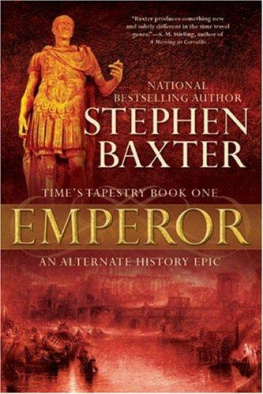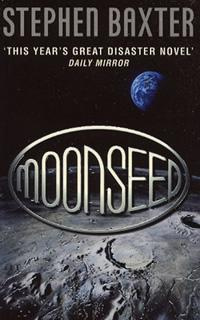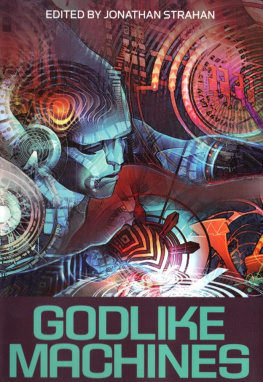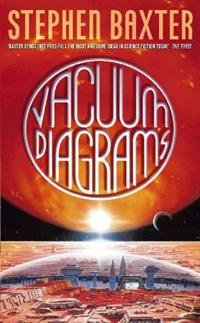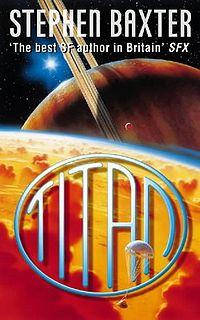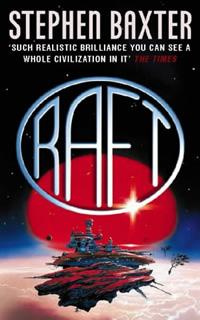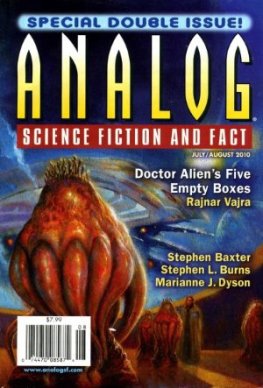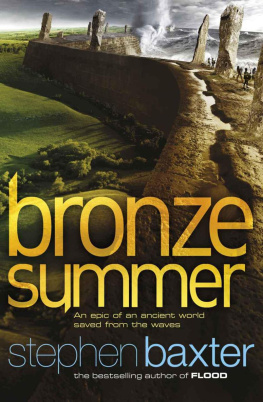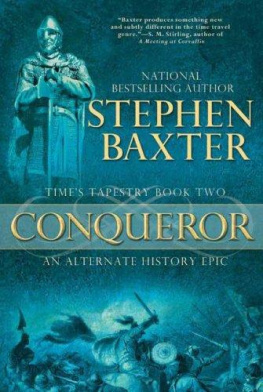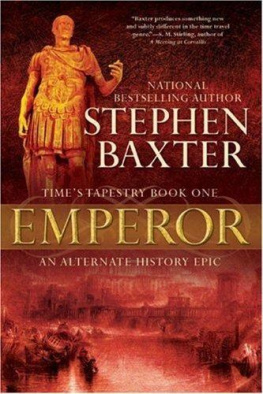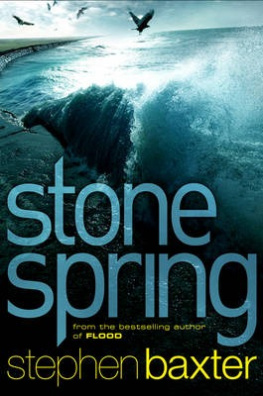Stephen Baxter - Emperor
Here you can read online Stephen Baxter - Emperor full text of the book (entire story) in english for free. Download pdf and epub, get meaning, cover and reviews about this ebook. year: 2009, publisher: Berkley Pub Group, genre: Detective and thriller. Description of the work, (preface) as well as reviews are available. Best literature library LitArk.com created for fans of good reading and offers a wide selection of genres:
Romance novel
Science fiction
Adventure
Detective
Science
History
Home and family
Prose
Art
Politics
Computer
Non-fiction
Religion
Business
Children
Humor
Choose a favorite category and find really read worthwhile books. Enjoy immersion in the world of imagination, feel the emotions of the characters or learn something new for yourself, make an fascinating discovery.
- Book:Emperor
- Author:
- Publisher:Berkley Pub Group
- Genre:
- Year:2009
- Rating:5 / 5
- Favourites:Add to favourites
- Your mark:
- 100
- 1
- 2
- 3
- 4
- 5
Emperor: summary, description and annotation
We offer to read an annotation, description, summary or preface (depends on what the author of the book "Emperor" wrote himself). If you haven't found the necessary information about the book — write in the comments, we will try to find it.
Emperor — read online for free the complete book (whole text) full work
Below is the text of the book, divided by pages. System saving the place of the last page read, allows you to conveniently read the book "Emperor" online for free, without having to search again every time where you left off. Put a bookmark, and you can go to the page where you finished reading at any time.
Font size:
Interval:
Bookmark:
Soon the carriage could move no further in the crush of traffic. The three passengers clambered out, Brigonius briskly, the women elegantly, and, leaving the unnamed slave with the carriage, they walked.
The air off the sea was fresh, and the sun was bright. The road was packed with people, their vehicles, slaves and animals. Everybody was funnelling towards the coast, where the road ended at the feet of the mighty arch. Children ran excitedly around the legs of the adults, and there was a hum of conversation. Vendors worked the slowly moving crowd, selling bits of meat on skewers, and oystersa speciality of Rutupiaeand tokens and trinkets to welcome the Emperor, pennants in imperial purple, and miniatures of the grave, bearded face that had become so familiar from his coinage.
With Brigonius and his broad shoulders taking the lead, the three of them made their way through the crush. Brigonius loomed taller than most; perhaps Brigantians ate better than these Roman-owned Cantiaci. His spirits rose to be part of this cheerful mob. He said, It feels like a festival.
Of course it does, Severa said. Thats the whole point. The emperors have always shown themselves to the crowds, at feast days, in the amphitheatres. Now this new Emperor is displaying himself to the provincesI believe he means to travel from end to end of his empire, as if it were one vast amphitheatre.
Why?
Well, he comes to unite, she said. Not to conquer like Claudius, or to indulge his vanity like Nero. The consolidator, they call him. Look around, Brigonius. Do you imagine any of these people, even the smallest child, will ever forget the day they saw the Emperor himself in person?
Brigonius grunted. From what I hear, there will be plenty of people who wont forget how much its costing them to entertain him.
Severa laughed. So young yet so cynical!
At last they broke out of the crowd. They came to a cordon patrolled by soldiers in dress uniform, with bright red cloaks and colourful plumes on their helmets. Severa spoke to one of the soldiers and passed him a note on a slip of wood; he glanced at it and hurried off to find a superior officer.
From here Brigonius could make out Rutupiae itself. It was a major port, in fact quite a large town. Blocky buildings of stone and wood sprawled around a harbour, and the tiled roof of a very grand mansio , there to host particularly distinguished visitors, gleamed, polished. On the sea ships floated at anchor, perhaps the ships that had transported the Emperor across the ocean from Gaul. Heavy and complex, their sails furled, they looked as if they had been painted on the blue sky.
And in the foreground, dominating everything, that quadruple triumphal arch loomed over the arrow-straight road from the west, its four columns like the legs of a giant. Clad in white marble imported from Italy, with lettering in bronze and its top ornamented with trophies of victory, it shone in the sun, no less than eighty feet high: the gateway to Roman Britain. Brigonius the quarryman wondered how its architect had ensured it would not sink into the soft coastal sand. It must have had deep and massive foundations.
Around the feet of this imposing structure people swarmed, dwarfed. Carpenters erected a stage in the crossroads beneath the arch. There were plenty of soldiers; Brigonius saw legionary pennants, the curling glitter of signal trumpets. It was quite a spectacle.
A decurion approached Severa and beckoned her forward. With some relief Brigonius moved out of the crush of the crowd, and with the women walked towards the stage.
Severa murmured, I dont imagine youve been here before, Brigonius. Does it call to something in your blood?
I dont understand.
It is here that the Romans under Claudius first made their landing in Britain. Of course there was nothing here then, just a bit of beach, no docks
Lepidina said, And no ugly monument.
And, Severa said, it was a landing witnessed by my grandmother, and by your great-grandfather Cunedda. Or so Agrippina always claimed.
Brigonius was unimpressed. Well, there are plenty of Romans swarming here today.
An emperor can hardly travel alone. Im told there are eight thousand troops, and probably as many administratorsclerks and accountants and lawyersthe imperial government travels with his person. And then there are all the cooks and cleaners and doctors and vets, and poets and musicians and architects and actors. The court is a mobile city. No wonder the provincials bleat about the expense!
They found a place amid the crowd gathering before the stage, and prepared to wait.
Severa pressed him, asking, Do you ever think of the past, Brigonius? Of the age of Agrippina and Cunedda, of the invasion, those brief days which have shaped our lives ever since? Time heaps up remorselessly. Your northern country is restless still, but it is already sixty years since the last great revolt in the south, when the cities burned. Sixty years .
Brigonius knew about that. His grandparents had been children then, and had survived Boudiccas burning of Camulodunum. Until they died they had been fearful of alarms, of disorderand of the smell of fire.
Severa said, But the invasion was some twenty years before that . It is all fading away now, fading into the past. Nobody alive remembers a Britain without the Romans.
Lepidina seemed bored. Why are you going on and on about the dead past, mother?
Severa said, Because of the Prophecy. Thats why were here, isnt it, Brigonius? She drew a leather satchel from a fold in her tunic. In here, she said, her eyes bright, is a single sheetold-fashioned Latin, scratched onto a bit of parchment. Only sixteen lines. Its the Prophecy , Brigonius. The Prophecy I mentioned in my letter. It was written down at the birth of Nectovelin, a cousin of my grandmother, Agrippina.
She told him something of the history of the Prophecy: how Agrippina and Cunedda had penetrated the house of Claudius himself, how a startling bit of foretelling had come trueand how Claudius afterwards had confiscated the document and placed with the Sibylline oracles. My grandmother moved to Rome, and spent many years trying to retrieve the document. She failedand so did my motherbut at last I found the right person to bribe.
Lepidina tutted. You tell me off about breaking the law with a bit of silver at my neck and you raid the vault of the Sibylline oracles! Youre a hypocrite, Claudia Severa.
But what is this Prophecy? Brigonius asked.
It is nothing less than a sketch of the futurethe future of the Romans, and of Britain under them.
The future? He tried to guess dates in his head. But it must already be more than a hundred years old.
A hundred and twenty-six, Lepidina said brightly. She fingered the fish pendant at her neck. It was written down in the same year as the birth of Jesus of Judea.
Who?
Severa snapped, Just the hero of another mystery cult out of the east, another fad for my daughter and other silly children in Rome.
Brigonius grinned. If the Prophecy is so old we are already in the future!
Severa nodded solemnly. But thats the point. Brigonius, the Prophecy has already started to come true . The Prophecy is past, present and future, all combined into one documentand through it our families are united across generations.
Brigonius frowned. Im not sure what you want of me, lady.
Listen to what it says. And she read three lines from the Prophecy:
The trembling skies declare that Romes great son has come to earth A little Greek his name will be. Whilst God-as-babe has birth Roman force will ram the islands neck into a noose of stone
Brigonius listened closely. What does it mean?
Why, I think its clear enough. Brigonius, the empire has grown huge, with long, unstable borders beyond which barbarians roam restlessly. The new Emperor is concerned to shore up those borders. He travelled to Germany, where he is building long walls of turf. Now here he is in Britain, where he will deal with the northern frontier. He intends to build another of his walls across Britainin the north, where, I am told, two estuaries converge to make the island narrow. You see? Now, to the best of my knowledge this wall is meant to be of turf, like the German frontier. But I have some associates who hope to persuade him to build it of stone.
Font size:
Interval:
Bookmark:
Similar books «Emperor»
Look at similar books to Emperor. We have selected literature similar in name and meaning in the hope of providing readers with more options to find new, interesting, not yet read works.
Discussion, reviews of the book Emperor and just readers' own opinions. Leave your comments, write what you think about the work, its meaning or the main characters. Specify what exactly you liked and what you didn't like, and why you think so.

